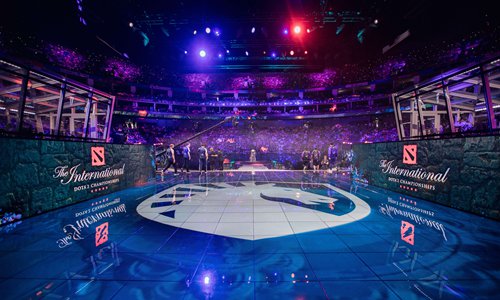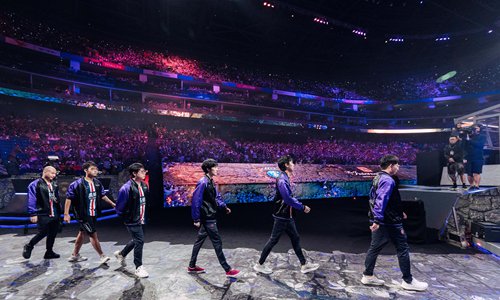HOME >> BUSINESS
Esports glory in Shanghai
By Li Xuanmin in Shanghai Source:Global Times Published: 2019/8/27 16:59:41
China boosts gaming talent search amid TI19 excitement

The International 2019 Dota 2 tournament at the Mercedes-Benz Arena in Shanghai on Sunday. Photos: Courtesy of the Perfect World
The International 2019 Dota 2 (TI19) championships ended on Sunday in the Shanghai's Mercedes-Benz Arena after a week of excitement.Amid cheers and applause, OG, an esports team based in Europe, defeated Team Liquid in the event's grand final with a 3-1 victory. LGD, a Chinese gaming club from Hangzhou, capital of East China's Zhejiang Province, finished the event in 3rd place. Another Chinese team, VG, finished in 6th place.
Founded in 2011, TI is the highest-level and biggest global competitive event for the multiplayer online game Dota 2. This year, the game's prize pool skyrocketed 30 percent year-on-year to hit a record-breaking $34.29 million, and the champion OG could net $15.6 million. The first runner-up, Team Liquid, will snap up $4.45 million, and the second runner-up, LGD's PSG.LGD, will take $3.08 million from the pot.
The tournament, hosted in an Asian city for the first time, has generated a huge buzz in China, mirroring the country's huge esports fan base and a booming industry on the fast-track.
It only took 53 seconds for all ticket packages for the event to sell out. On China's Twitter-like Weibo, TI19-related topics have been viewed 2.21 billion times and discussed 763,000 times as of 9am on Monday.
Every seat was filled during the battle between PSG.LGD and Team Liquid for the ticket to advance to the final match on Sunday. Amid a vibrant atmosphere, the audience cheered loudly when players displayed complicated gaming techniques and a spirit of teamwork.
"This is the game I played for about a decade and it represents my memory from youth… Time flies but our passion for esports games, for Dota, will never fade away," a 28-year-old audience member surnamed Chen told the Global Times on Sunday. He had travelled to Shanghai all the way from Fuzhou, capital of East China's Fujian Province, to watch the final match.
The game's first official appearance in China marks a significant milestone in the country's esports market. Industry insiders said that the country's role in the market has shifted from a follower to becoming a global leader and a dominant power.
"The esports industry's business model has been maturing in recent years, driven partly by global competitions like TI19 and a growing young consumer audience market," Xiao Hong, CEO of Perfect World, told the Global Times over the weekend.
In 2018, China's esports market volume hit 94.05 billion yuan ($13.15 billion) and it is expected that the industry will generate 135 billion yuan of value in 2020, according to a report issued by iiMedia.
There are now over 50,000 people working in the industry, and the number is expected to grow past 250,000 rapidly by 2020, according to another report issued by China's Ministry of Human Resources and Social Security (MHRSS). In the first half of 2019, the revenue from esports sales topped 51.3 billion yuan.

Members of Chinese gaming club LGD walk on stage on Sunday in Shanghai.
Business modelA landmark change in the esports industry is the rising number of sponsors, ranging from automobile and hardware firms to banks and fast-moving consumer goods companies. This comes together with an expanding, young audience base with strong consumption power, according to Pan Fei, the manager of LGD Gaming's Dota division.
The PSG.LGD team has signed a partnership deal with the Chinese Harbin Brewery and China CITIC Bank. The CITIC logo will appear on PSG.LGD jerseys, while the deal with Harbin Brewery will involve more social media promotion.
In addition to sponsorship, there are another four major streams in which PSG.LGD could secure income: tournament prize money as well as dividends from operation income in the esports league, transfer income, sales from their online fan store that sells peripheral products, and home stadium operation, Pan explained.
Yang Shunhua, manager of gaming club RNG, told the Global Times over the weekend that the club's major revenue originates from sponsorship and tournament prizes, while expenditures are mostly esports players' salaries.
"Most Chinese esports clubs are in a loss, but things are getting better as the industry's environment is improving and we begin to see income hikes," he noted.
Pan recalled that in 2010, professional esports players' monthly earnings were only about 1,000 to 2,000 yuan, and some players could not afford the cost of accommodation and travel when participating in competitions.
Now, about 86 percent of players on the esports payroll earn one to three times more than the average wage in their cities, according to the report issued by the MHRSS. For top players, annual pay generally amounts to at least 1 million yuan, the report said.
Star esports players, like Chinese League of Legends player Uzi from RNG, and The Shy and Rookie from Invictus Gaming (IG), each have a market value of over 10 million yuan, media reports said. IG, founded by tycoon Wang Sicong, won the 2018 World Championship of League of Legends.
Industry players admitted that the current esports industry's business model is not mature enough to be compared with traditional sports such as basketball and football.
"We are trying to perfect our business models, especially in exploring incomes from home stadium operation to translate the benefits from fan's online consumption power into offline, on-site consumption at our stadium. We only saw a small share of income from this sector, while professional football clubs like Real Madrid and FC Barcelona generate a bulk of their income from stadium operation," Pan said.
Xiao suggested that China's esports industry should draw on the business model of the National Basketball Association (NBA) to derive more revenue from the sales of gaming events' broadcasting rights and to boost the commercial value of professional esports players.
"Esports highly resembles football and basketball in development as they have gone through ups and downs over hundreds of years. Therefore, the esports industry can be expected to achieve its glory, just like football and basketball," Xiao noted.
"The prospect of the esports industry's commercial value is even more promising than traditional sports with the arrival of the 5G era and the adoption of innovative technologies like virtual reality and cloud services," Xiao added.
He predicted that more business models will be developed surrounding the esports industry in the future to increase revenue, such as esports reality shows, esports social networking, esports travel and esports hotels.
Lack of talent
In a January statement, China released a preliminary announcement for 15 new professions recognized by the country, among which esports athletes are listed along with artificial intelligence engineers, big data engineers and drone pilots.
Despite Beijing's firm support, some analysts pointed out that the industry's fast-track development is not in tandem with the cultivation of related esports talent.
According to the report issued by MHRSS, China will face a shortage of 2 million esports professionals over the next five years, while only 15 percent of the market has been saturated.
Pan said that the industry is also in urgent need of operational staff in business development, event organization, branding, management and media relations.
"In fact, we have a selection scheme which helps our club to train and foster esports players since they are 15 years old. We also have a special position similar to 'talent scout' that explores players of great potential from all kinds of competition and game ranking lists," Pan explained.
In addition to professional technician talent, the long-term development of the country's esports industry also calls for the cultivation of high-end, versatile talent who understand esports very well and are also able to apply their knowledge in other related sectors, such as big data analysis, according to Xiao.
To ameliorate the shortage, Xiao told the Global Times that Perfect World has already partnered with the Sichuan University of Media and Communications to set up an international gaming and esports college.
Thus far in China, more than 100 colleges and universities have opened courses and programs on esports to train more high-end talent.
Posted in: INDUSTRIES,BIZ FOCUS